Understanding Social Media Screening: What Employers Seek and Why
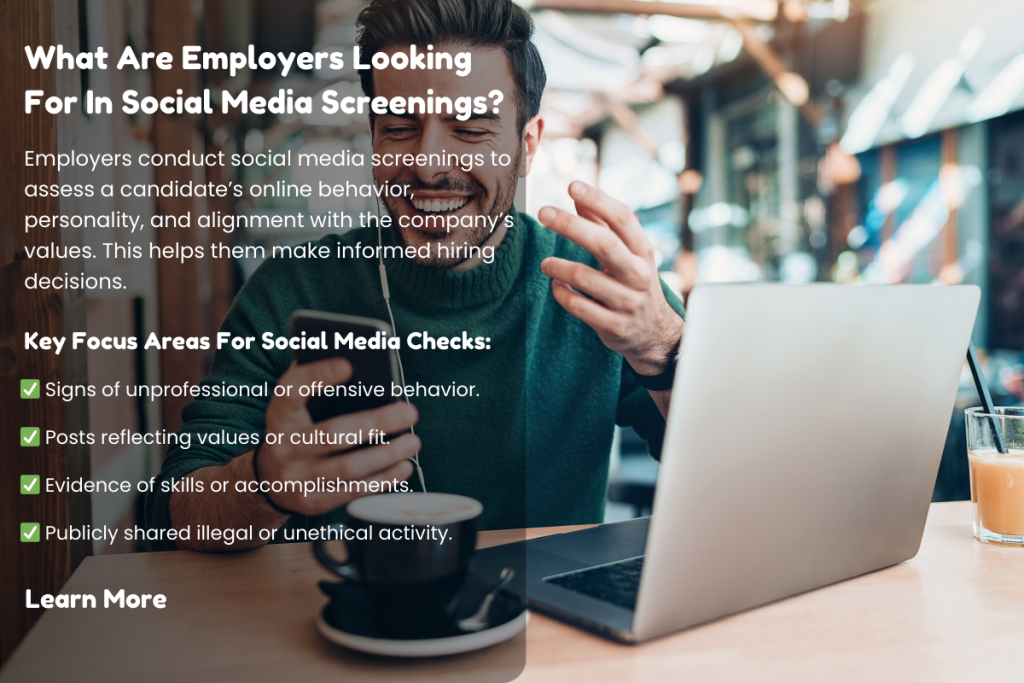
What Are Employers Looking For When They Conduct a Social Media Screening?
Social media has become an integral part of our lives, influencing not just how we connect with others but also how we present ourselves professionally. For employers, social media provides a unique lens into a candidate’s personality, professionalism, and alignment with the company’s values. Social media screenings are increasingly used alongside traditional background checks to provide a comprehensive view of potential hires.
What Is Social Media Screening?
Social media screening involves reviewing publicly available content on a candidate’s social media profiles. This includes platforms like LinkedIn, Twitter, Instagram, Facebook, and even lesser-used platforms such as Reddit or TikTok, depending on the role and industry. Employers use social media screening to gather insights beyond the confines of a resume or interview, seeking information about a candidate’s character, communication style, and overall suitability for a role.
Unlike traditional background checks, which focus on verifying employment history, criminal records, and educational qualifications, social media screening delves into how individuals present themselves online. It can uncover additional information, from personal interests and hobbies to values and communication styles, offering a holistic view of a candidate.
Social media screening is particularly valuable in industries where public representation matters, such as marketing, public relations, and customer-facing roles. It can also reveal red flags, ensuring the candidate aligns with the company’s ethos and avoiding potential reputational risks.
Why Do Employers Conduct Social Media Screenings?
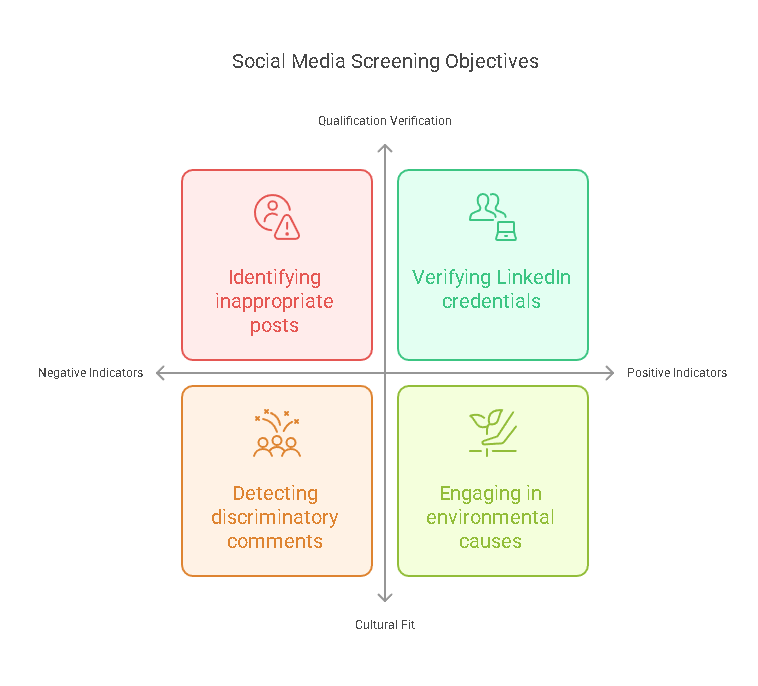
The reasons behind social media screenings are multifaceted. Employers turn to this approach to ensure they hire candidates who are not only qualified but also a cultural fit and a positive addition to the workplace.
1. Identifying Red Flags
Employers aim to identify potential issues that may not surface during interviews or on resumes. This could include:
- Inappropriate or offensive posts.
- Evidence of illegal activities or substance abuse.
- Aggressive or discriminatory comments.
Such content may indicate behaviors that could harm the company’s reputation or disrupt workplace harmony.
2. Verifying Qualifications and Integrity
Social media can serve as a secondary source to verify a candidate’s qualifications and claims. For example:
- LinkedIn profiles can validate job titles, employment dates, and professional achievements.
- Posts or portfolios shared online can showcase skills, creativity, and expertise.
Discrepancies between a candidate’s resume and their online presence may raise concerns about credibility.
3. Assessing Cultural Fit
Cultural fit is crucial for maintaining a cohesive and collaborative work environment. Social media profiles often provide subtle clues about a person’s values, interests, and lifestyle, helping employers determine if they align with the organization’s culture.
For instance:
- A candidate actively engaged in environmental causes may resonate with a company promoting sustainability.
- Someone frequently sharing professional insights or attending industry events may indicate a commitment to growth and expertise.
What Employers Look For in Social Media Screening
Social media screenings encompass both positive and negative evaluations. While employers may flag content that raises concerns, they also look for qualities that highlight a candidate’s professionalism and potential.
Positive Indicators
- Professionalism: Candidates sharing insightful industry posts or maintaining a polished LinkedIn profile demonstrate professionalism and dedication.
- Creativity and Passion: Personal projects, blogs, or artistic endeavors showcased on social media can indicate creativity and passion.
- Consistency: Profiles consistent with the candidate’s stated qualifications and experiences boost credibility and trust.
- Community Engagement: Volunteering or advocacy posts reflect a sense of responsibility and leadership.
Negative Indicators
- Inappropriate Content: Posts involving hate speech, discriminatory language, or offensive humor can disqualify a candidate.
- Illegal Activities: Evidence of drug use, underage drinking, or any illegal activities is a major red flag.
- Frequent Unprofessional Behavior: Excessive use of profanity, public arguments, or oversharing personal grievances may suggest a lack of discretion or professionalism.
- Conflicts of Interest: Posts revealing affiliations with competitors or conflicting interests may cause concern.
Factors Influencing Social Media Screening Practices
While employers find value in social media screenings, their methods are shaped by the specific role, industry, and hiring objectives. For example:
- Industry-Specific Standards: Industries like education or healthcare may have stricter criteria for social media behavior.
- Role-Specific Expectations: A marketing role might prioritize creativity and online engagement, while a compliance role demands discretion and professionalism.
- Public vs. Private Profiles: Employers typically review publicly available content to avoid infringing on privacy rights.
By balancing these considerations, employers aim to ensure fair, consistent, and legally compliant social media screening practices.
Key Areas Employers Focus On During Social Media Screenings
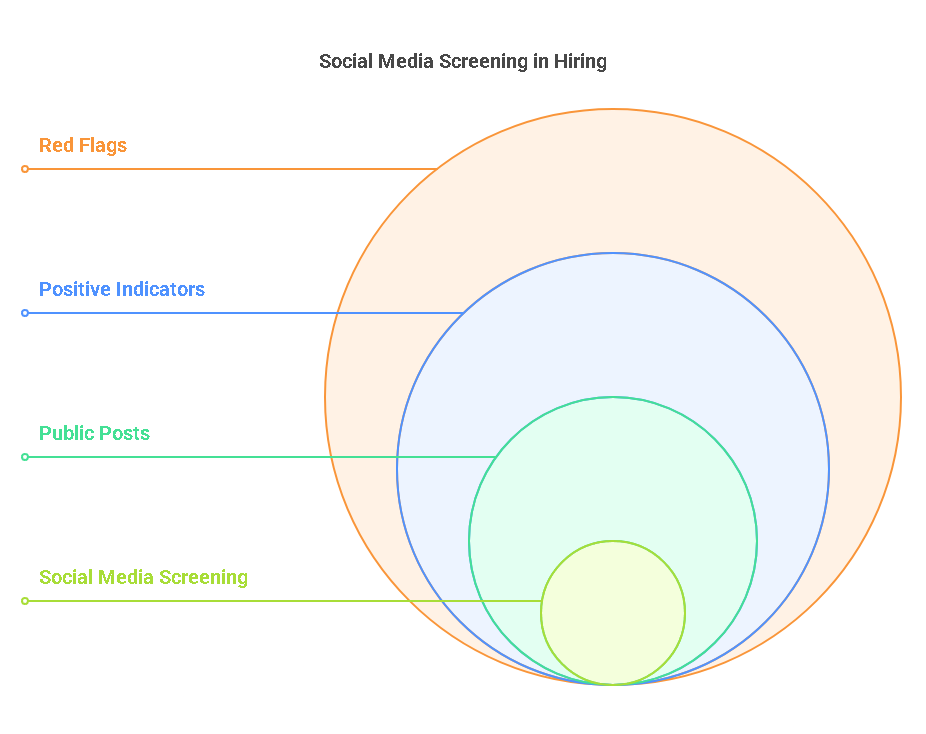
In today’s digital age, social media has become an essential tool for communication and personal branding. However, for employers, it is also a key source of information when it comes to evaluating potential candidates for job openings. Social media screenings have risen in popularity as part of the hiring process because they offer additional insights into a candidate’s character, behavior, and professionalism that may not be apparent in traditional resumes, interviews, or background checks. In this section, we will take an in-depth look at the areas that employers focus on when they conduct social media screenings and how these screenings benefit employers.
Public Posts: Evaluating Professionalism and Alignment
One of the first things employers evaluate during a social media screening is a candidate’s public posts. These posts can provide insights into how a candidate presents themselves online and whether their online behavior aligns with the company’s culture. Employers look for posts that reflect professionalism, respect for others, and a sense of responsibility. A candidate’s posts can also demonstrate their creativity, industry knowledge, and passion for their field.
- Positive Indicators: Employers will often look for posts that highlight professional achievements, participation in relevant industry events, or thought leadership. For instance, a candidate sharing articles, commenting on industry trends, or providing insights on professional matters can signal that they are well-engaged and knowledgeable.
- Red Flags: On the other hand, posts that show political extremism, divisive opinions, or inappropriate behavior (e.g., profanity or personal attacks) can raise concerns. These behaviors could indicate potential conflicts with the company’s values or risk alienating colleagues or clients. For instance, sharing controversial opinions or engaging in arguments on social media could lead employers to question whether a candidate can work in a collaborative or professional environment.
In general, employers are looking for consistency between the candidate’s public persona and the qualifications, skills, and professionalism they presented in their application or during the interview.
Photos and Videos: The Visual Representation
Beyond written posts, photos and videos play an equally significant role in social media screenings. Images shared publicly on platforms like Facebook, Instagram, or LinkedIn offer visual representations of a candidate’s lifestyle, interests, and activities. While it’s not uncommon for candidates to share images related to their personal lives, employers pay attention to how these images might impact their professional image.
- Positive Indicators: Photos showcasing professional events, conferences, volunteer work, or team collaborations are positive indicators that a candidate is engaged in professional development. A picture from a networking event, for example, could suggest that the candidate is proactive about building connections in the industry.
- Red Flags: Candidates who share inappropriate, offensive, or illegal images may raise red flags. For instance, a photo of a candidate participating in illegal activities, consuming excessive alcohol, or engaging in behavior that contradicts company values could result in disqualification. Inappropriate selfies or photos with questionable content can undermine a candidate’s chances of getting hired.
Employers may also look for signs that a candidate is comfortable in front of the camera and can present themselves well on public platforms. In an increasingly digital world, candidates who have a polished and professional online presence may be seen as more suitable for positions requiring public interaction.
Comments, Shares, and Interactions: Behavioral Patterns
While posts and photos are certainly important, how candidates engage with others on social media is just as telling. Employers will often evaluate comments, shares, and likes to gauge a candidate’s social behavior and online personality. Engaging respectfully with others can indicate emotional intelligence, while negative interactions can suggest issues with impulse control or interpersonal communication.
- Positive Indicators: A candidate who shares meaningful posts, offers thoughtful comments, and engages respectfully in conversations can demonstrate a professional online demeanor. Additionally, a person who shares others’ content in a positive and supportive manner is seen as a team player who contributes to a collaborative culture. This is especially important in industries that require strong communication, networking, or public relations skills.
- Red Flags: If a candidate frequently posts negative comments, participates in online arguments, or spreads harmful content (e.g., hate speech or discriminatory remarks), this can be seen as a major red flag. Employers may also take issue with candidates who make controversial statements or attack others publicly. For instance, a candidate who constantly criticizes their previous employers or coworkers could raise concerns about their ability to work within a team.
Patterns of interaction are particularly important because they reflect how a candidate might communicate with colleagues, clients, and customers in a professional setting. Engaging with others in a negative or unprofessional manner online could translate into similar behavior in the workplace.
Group Memberships, Associations, and Follower Interactions
Employers may also take note of the groups and associations that a candidate is affiliated with on social media platforms. Whether it’s joining industry-specific groups or engaging in hobby-related communities, this can offer insights into a candidate’s interests, values, and networking skills.
- Positive Indicators: Joining professional organizations, career-related groups, or forums related to industry topics is a good sign. It indicates that the candidate is committed to professional growth and networking within their field. For example, a candidate who is a member of an online group for software developers might be seen as proactive in their professional development.
- Red Flags: However, employers may take issue with candidates who are affiliated with controversial or disreputable groups. For instance, a candidate who follows or is a member of extremist organizations, hate groups, or any group that promotes harmful ideologies may be considered a liability to the company’s reputation.
Membership in certain groups also signals whether the candidate is well-rounded and open to new ideas or if they hold narrow, divisive views that could potentially disrupt team dynamics.
Evidence of Leadership, Teamwork, and Social Responsibility
For many employers, social media screenings can provide insights into a candidate’s leadership qualities, teamwork capabilities, and commitment to social responsibility. A strong social media presence that highlights leadership roles or charitable efforts can set a candidate apart from others.
- Positive Indicators: Sharing stories of volunteer work, community involvement, or mentoring initiatives can demonstrate that the candidate is socially responsible and willing to go beyond the minimum expectations. Leadership activities such as organizing events or campaigns also suggest that the candidate can take charge and inspire others, making them an excellent addition to any team.
- Red Flags: Conversely, candidates who do not display any form of teamwork, community involvement, or social responsibility may be seen as self-centered or uninterested in contributing to the broader good. While this may not always be a deal-breaker, employers generally prefer candidates who align with values like collaboration, social responsibility, and community engagement.
Many companies today emphasize a commitment to social causes, sustainability, and corporate social responsibility (CSR). Therefore, candidates who demonstrate these values on social media may be more attractive to employers.
Benefits of Social Media Screening for Employers
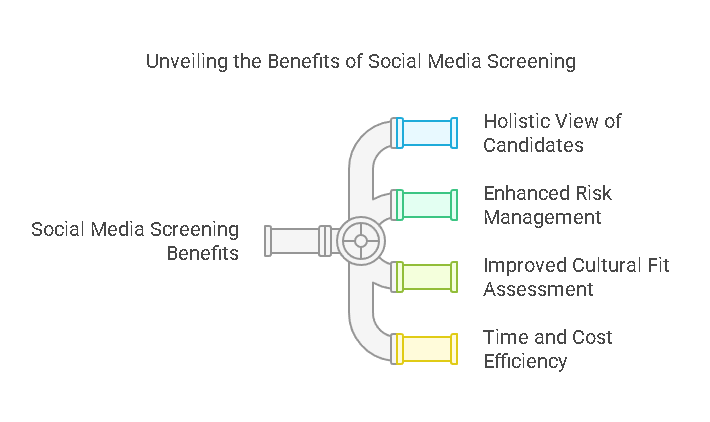
Employers who incorporate social media screening into their hiring process gain a wealth of information that helps them make better, more informed decisions. Let’s look at some of the key benefits of these screenings for employers.
1. Holistic View of Candidates
Social media screenings provide a more well-rounded understanding of a candidate. While resumes and interviews are valuable, they often focus on professional skills and qualifications. Social media allows employers to see the personality, behavior, and interests of a candidate. This added layer of insight helps employers make better decisions regarding whether the candidate will be a good fit for the company culture.
2. Enhanced Risk Management
By reviewing candidates’ online presence, employers can identify potential red flags that may pose a risk to the workplace. Whether it’s unprofessional behavior, offensive content, or illegal activities, social media screening can help employers avoid making costly mistakes in their hiring decisions. It is far better to uncover potential issues during the hiring process than to face these problems once the candidate has already been hired.
3. Improved Cultural Fit Assessment
Social media provides insight into a candidate’s values, beliefs, and behavior. This can help employers assess whether a candidate will fit into the existing company culture. Companies that value diversity, inclusivity, or environmental sustainability may prioritize candidates whose social media profiles reflect similar values.
4. Time and Cost Efficiency
Traditional background checks can be time-consuming and expensive. By utilizing social media screenings, employers can often gather a lot of information quickly, helping to speed up the hiring process. Social media screening is a cost-effective tool that can prevent the need for further costly background checks, especially when red flags are immediately detected.
PreciseHire’s Role in Social Media Screening
PreciseHire offers a comprehensive employment screening service that includes social media screenings. With our extensive experience and ethical practices, we ensure that employers receive thorough, unbiased, and compliant social media reports.
Why Choose PreciseHire for Social Media Screening?
- Ethical Screening: At PreciseHire, we adhere to the highest ethical standards when conducting social media screenings. We ensure compliance with legal requirements, privacy regulations, and fairness throughout the process.
- Tailored Solutions: We understand that each company is unique, which is why we provide customizable screening solutions based on your specific needs. Whether you need to assess cultural fit, professional expertise, or leadership qualities, we tailor our services to suit your requirements.
- Comprehensive Reports: Our reports provide clear, actionable insights into a candidate’s social media presence. We summarize key findings, highlighting both positive traits and potential red flags that could affect your hiring decision.
- Quick Turnaround: We understand the importance of time in the hiring process. PreciseHire ensures fast turnaround times, helping you streamline your recruitment efforts.
Data Table: Key Areas of Focus in Social Media Screenings
Here is a table that summarizes the key focus areas that employers examine during social media screenings:
| Aspect | What Employers Look For | Positive Outcomes | Red Flags |
|---|---|---|---|
| Public Posts | Professionalism, respectful language, industry-relevant insights. | Shows industry engagement, professionalism, and leadership. | Offensive opinions, controversial views, or unprofessional behavior. |
| Photos and Videos | Visual representation of professionalism, creativity, and hobbies. | Positive professional images, active participation in events. | Inappropriate behavior, illegal activities, unprofessional photos. |
| Comments and Shares | Respectful interactions, meaningful discussions, and engagement. | Collaborative communication, team-oriented personality. | Negative comments, arguments, or engagement in harmful discourse. |
| Group Memberships | Involvement in professional or industry-related groups. | Shows industry interest, proactive networking. | Membership in extremist or controversial groups. |
| Leadership and Social Responsibility | Community service, teamwork, leadership roles. | Shows initiative, social responsibility, and leadership. | Lack of social responsibility or teamwork; self-centered focus. |
Legal Aspects of Social Media Screening
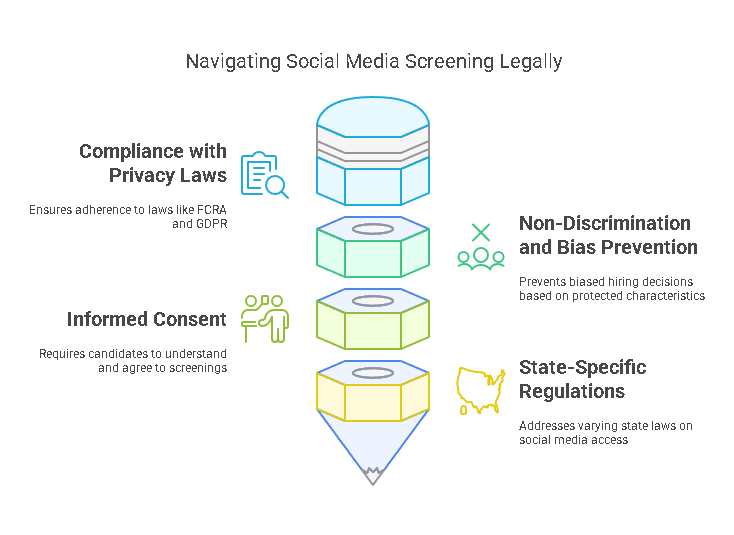
While social media screening can provide valuable insights into a candidate’s personality, professionalism, and potential fit within a company, there are significant legal considerations that employers must take into account to ensure the process is conducted fairly, ethically, and in compliance with applicable laws. Below, we will discuss key legal aspects that employers must be mindful of when conducting social media screenings.
1. Compliance with Privacy Laws
Social media screening falls within the broader context of background checks, and just like with traditional background checks, employers are required to comply with various privacy laws. In the United States, for example, the Fair Credit Reporting Act (FCRA) governs the use of background check information, including social media screening. Employers must obtain written consent from candidates before conducting social media screenings, just as they would for other types of background checks.
Moreover, the General Data Protection Regulation (GDPR) in Europe provides additional privacy protections for job applicants, particularly when it comes to how personal data is handled. Employers must ensure that any social media data they collect is processed fairly, transparently, and with the applicant’s knowledge.
2. Non-Discrimination and Bias Prevention
One of the biggest risks with social media screening is the potential for discrimination or bias. Since social media profiles often reveal information about a candidate’s race, gender, age, religion, sexual orientation, and other personal characteristics, it is essential that employers avoid using this information in a way that could lead to biased hiring decisions.
The Equal Employment Opportunity Commission (EEOC) prohibits discrimination based on characteristics such as race, color, religion, sex, and national origin. Employers must be cautious not to let any protected characteristics influence their hiring decisions. For example, an employer should not disqualify a candidate simply because their social media profile includes information about their religion or political views unless it directly impacts their ability to perform the job.
Employers should ensure that the social media screening process is standardized across all candidates and that they only evaluate aspects that are relevant to the role and the company’s needs. It is also essential to avoid looking at private social media accounts, as this could lead to inadvertently accessing discriminatory or personal information.
3. Informed Consent
Before conducting a social media screening, employers must obtain informed consent from candidates. This is especially important because social media profiles can contain personal information that is not typically included in traditional resumes or job applications. Candidates should be clearly informed about what information will be reviewed, how it will be used, and whether it will affect their chances of getting hired.
Informed consent is a critical aspect of complying with privacy laws. Candidates must have the opportunity to opt out of the social media screening process if they wish. Employers who fail to obtain proper consent risk legal issues, including lawsuits or penalties for violating privacy rights.
4. State-Specific Regulations
Laws regarding social media screening can vary from state to state, especially in the United States. For example, some states have specific laws that restrict employers from requesting or reviewing private social media accounts. California and Illinois are two examples of states that have enacted laws that limit the ability of employers to ask candidates for access to private social media profiles.
In California, for instance, the California Social Media Privacy Act prohibits employers from requiring job applicants or employees to disclose their social media passwords or provide access to private accounts. Similarly, Illinois has a Right to Privacy in the Workplace Act, which prohibits employers from requesting access to an applicant’s private social media accounts.
It is essential for employers to stay informed about state-specific regulations to avoid legal violations and ensure that their social media screening practices are compliant with the law.
Frequently Asked Questions (FAQs)
1. What Platforms Do Employers Typically Review During Social Media Screening?
Employers most commonly review publicly available profiles on platforms like LinkedIn, Facebook, Twitter, Instagram, and TikTok. These platforms are widely used for personal branding, networking, and professional development, making them key areas of focus. Employers may also look at professional forums or industry-specific groups on platforms like Reddit or GitHub, depending on the nature of the job.
Can an Employer Reject a Candidate Based Solely on Their Social Media Activity?
While an employer may factor in information gathered from a candidate’s social media activity during their decision-making process, they cannot reject a candidate based solely on personal characteristics or beliefs revealed through social media that are protected under anti-discrimination laws. An employer must be able to demonstrate that the reason for rejecting the candidate is based on relevant job qualifications or behaviors, rather than protected characteristics like race, gender, or political beliefs.
How Can Job Applicants Clean Up Their Social Media Profiles Before Applying?
Job applicants who wish to present themselves positively in the hiring process should consider the following steps:
- Review privacy settings: Ensure that personal posts, photos, or conversations that may be inappropriate or irrelevant are kept private.
- Remove controversial content: Delete or hide posts, photos, or videos that may be deemed unprofessional or offensive.
- Highlight professional achievements: Make sure to share content that demonstrates your industry expertise, networking activities, and volunteer work. Regularly update your LinkedIn profile to reflect your resume and professional achievements.
- Consider a social media audit: Some candidates opt to have a third-party conduct a social media audit to ensure they present the best version of themselves online.
What Is the Difference Between Social Media Screening and Background Checks?
Social media screening focuses on reviewing an applicant's online presence to assess their behavior, personality, and professionalism, while traditional background checks focus on verifying a candidate's criminal history, employment history, education, and financial background. Social media screenings provide additional insight that may not be available through conventional background checks and offer employers a deeper understanding of a candidate’s character and fit for the company culture.
Is It Legal for Employers to Review Private Social Media Accounts?
In most cases, employers are not allowed to review private social media accounts without explicit consent from the candidate. Many states, including California, have passed laws that protect employees' and job applicants' privacy rights by prohibiting employers from requesting private social media account passwords or accessing private profiles without permission. Employers must be cautious to avoid violating privacy laws and should always obtain informed consent before accessing social media profiles.
Conclusion
Social media screening has become an important part of the hiring process, providing employers with valuable insights into a candidate’s professionalism, behavior, and cultural fit. While it offers numerous benefits, including risk management and a more holistic view of candidates, it is crucial that employers conduct social media screenings ethically and in compliance with privacy laws.
Employers must be cautious not to let social media profiles influence hiring decisions based on protected characteristics and should follow best practices such as obtaining informed consent and adhering to non-discrimination guidelines. By integrating social media screenings into a fair and transparent hiring process, employers can make better-informed decisions that contribute to building strong, diverse, and cohesive teams.
For companies looking to streamline their employment screening process, PreciseHire offers professional social media screening services that comply with legal standards while ensuring a comprehensive review of candidates’ online presence. By partnering with a trusted screening provider like PreciseHire, businesses can maintain a fair, effective, and legally compliant hiring process.
